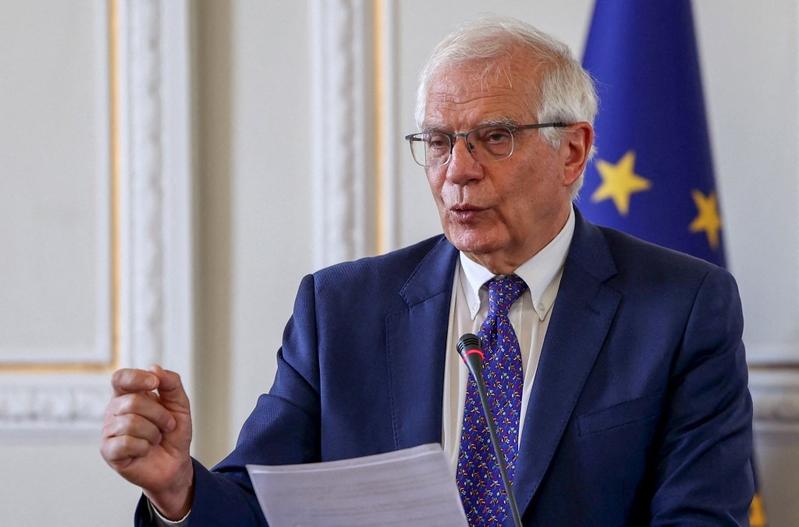 In this file photo dated June 25, 2022, Josep Borell, the High Representative of the European Union for Foreign Affairs and Security Policy speaks during a joint press conference with the Iranian Foreign Minister at the foreign ministry headquarters in Iran's capital Tehran. (ATTA KENARE / AFP)
In this file photo dated June 25, 2022, Josep Borell, the High Representative of the European Union for Foreign Affairs and Security Policy speaks during a joint press conference with the Iranian Foreign Minister at the foreign ministry headquarters in Iran's capital Tehran. (ATTA KENARE / AFP)
VIENNA / PRAGUE - European Union foreign ministers meeting later this week, are unlikely to unanimously back a visa ban on all Russians, as would be needed to put in place such a ban, EU foreign policy chief Josep Borrell told Austria's ORF TV on Sunday.
"I don't think that to cut the relationship with the Russian civilian population will help and I don't think that this idea will have the required unanimity," Borrell, who chairs EU foreign ministers' meetings, told the national broadcaster.
The Czechs, who currently hold the EU's rotating presidency, are pushing for an EU-wide ban on visas for Russian tourists, an idea supported mainly by the Baltic countries
"I think that we have to review the way that some Russians get a visa, certainly the oligarchs not. We have to be more selective. But I am not in favor of stopping delivering visas to all Russians."
The Czechs, who currently hold the EU's rotating presidency, are pushing for an EU-wide ban on visas for Russian tourists, an idea supported mainly by the Baltic countries.
However, Germany, some other member states and Borrell reject such a move, arguing it might breach EU rules and cut off escape routes for Russian dissidents.
ALSO READ: EU's sanctions on Russia weigh on own economy
Lithuanian Foreign Minister Gabrielius Landsbergis has said Estonia, Latvia, Lithuania, Poland and Finland, which all share a border with Russia, may act on their own to block tourists if the EU does not agree on a union-wide ban.
Russians mostly enter the EU via the land borders of the five countries since direct flights between Russia and the bloc were suspended following the start of the Russia-Ukraine conflict, according to Landsbergis.
In mid-August, Estonia closed its border to more than 50,000 Russians with previously issued visas, the first country in the EU to do so.
Ukrainian President Volodymyr Zelenskiy called on the West earlier this month to impose a blanket travel ban on Russians, drawing an angry rebuke from Moscow.
ALSO READ: US, NATO urged to stop adding fuel to fire in Ukraine conflict
EU defense and foreign ministers will also discuss options for setting up an EU military training mission for Ukrainian forces.
Several EU countries have been training Ukrainian troops for a while, mainly enabling them to operate weapons Western nations are delivering to Ukraine.
It is not clear yet where an EU training program could be based and what mandate it might have, EU diplomats told Reuters ahead of the defense ministers' meeting on Monday and Tuesday.
Borrel, has given few details of his plans so far, merely stating such a program would not be based in Ukraine but in neighboring countries.
READ MORE: EU presidency to focus on effects of Russia-Ukraine conflict
At a joint session with UN and NATO representatives, defense ministers will also discuss the future of the EU's suspended training mission in Mali and the UN peacekeeping force MINUSMA.


